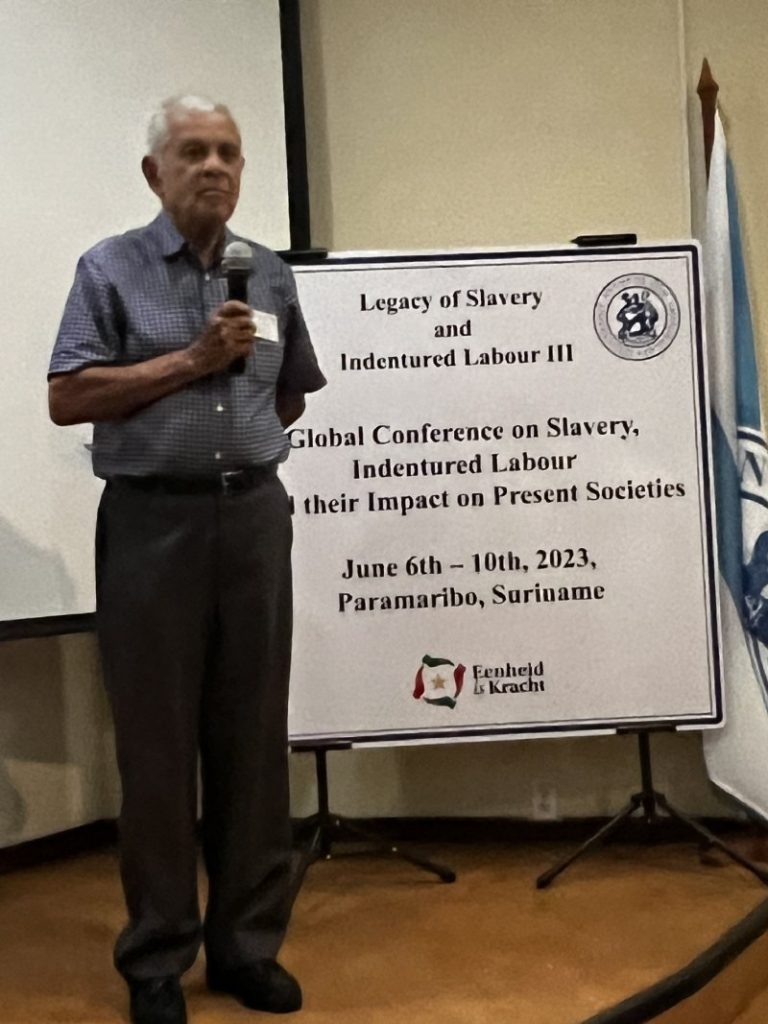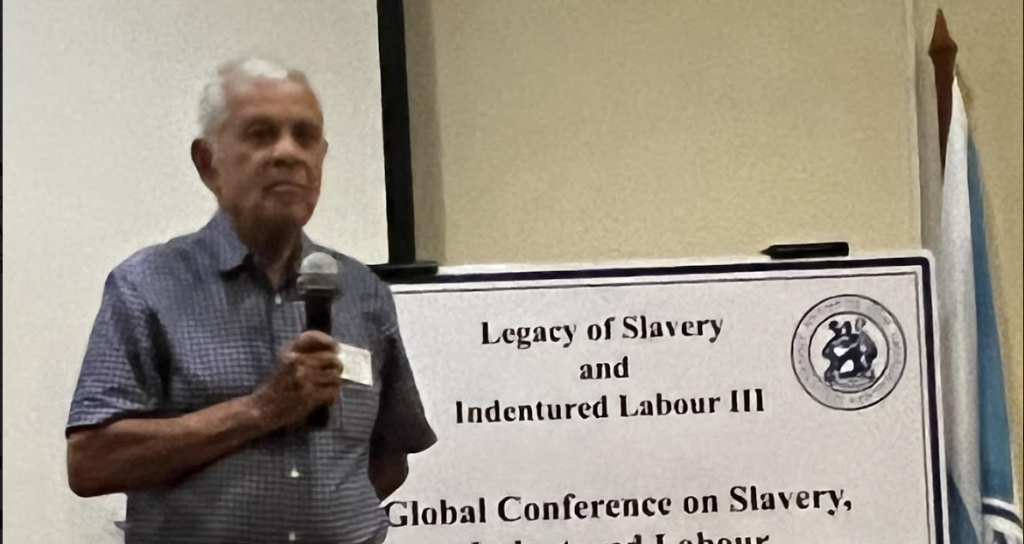The death of Dr. Brinsley Samaroo, retired eminent Professor of History at UWI, a foremost pioneer and specialist on Indian Caribbean history is an irreparable loss to the community and to those who study it. He was among the most outstanding historians Trinidad had yet produced.
He died on July 9 after suffering an aneurysm on July 5. He was 84.
Dr. Samaroo was known globally for his pioneering writings on Indian indentureship or girmitya labor. He single-handedly helped to document and preserve the rich Indian regional histories. He was one of the most erudite and prolific scholars of Indian history. His death marks the end of an era for studies of Indian history. Not surprisingly, the entire history fraternity came forward to pay homage to Prof. Brinsley, which speaks volumes for the imprint he has left on them. Eminent academicians the world over, including his former students now teaching in different universities and colleges, and even younger generations who never met him but who have known him through his work — all expressed their deep sense of sorrow over his passing. He inspired a generation of historians and other scholars in social sciences. Few intellectuals in Trinidad and Tobago and the Caribbean have been as admired and revered as him.
I had the honor of interacting with him over the decades and hosted him in New York, even organizing a dinner and honoring him for his works. His death leaves a major void in the study of the history of Indians. He was witty and wise and had a rich knowledge of Indian history.
Samaroo was attached to UWI since the early 1970s and at one time headed the history department. He was eminently qualified to head the department having excelled in academia. He earned his BA in History from the prestigious Hindu College, Delhi University in the 1960s and went on to do his PhD in England. After his Ph.D., he joined the faculty at UWI teaching history courses. He was a specialist in Indian history, slavery, and indentureship. In the last couple decades of his life, his academic work focused primarily on Indians – indentured laborers or girmityas and their descendants. He published countless articles and penned several books. He supervised countless students in the social sciences. He also appeared on many TV and radio programs discussing subjects related to history and politics. Anyone who studied Caribbean history or wanted to know about Indians in the Caribbean would have read his works.
Samaroo was always helpful to all students including struggling Guyanese who were studying at UWI during the Burnham dictatorship – in their studies in Trinidad, in providing accommodations, and or putting them in touch with students to provide comfort, lodging, etc. He served as an overseas examiner for UG for several years. He related accounts of his experience in Guyana during the period of banned goods and kick-down door robberies. “It was a challenge to survive”, he said. He said when he went to Guyana as an external examiner, he empathized with students who were in tears having suffered from banditry and other crimes and or starvation.
Samaroo was moved to become involved in the struggle against the Guyanese dictatorship providing moral support from 1980 thru the restoration of democracy in 1992. He supported our group in NY and a group founded in Trinidad to oppose the dictatorship.

Nevertheless, Samaroo quietly gave support to an Indian youth movement in Trinidad including making available rooms for meetings at UWI to address social issues impacting Indians. Our group in NY and the support group in Trinidad worked closely with him and the then-political opposition led by Basdeo Panday (TT Alliance) with who Samaroo was affiliated. A few of us flew down from NY and assisted in the 1981 election campaign with the understanding that if it were to win it would support our movement for free and fair elections in Guyana; the opposition lost. Samaroo did not contest a seat in parliament, but he remained supportive of our struggle for free and fair elections in Guyana. He was appointed Opposition Leader in the Senate by Panday who remained opposition Leader, a position he held since 1976. Samaroo served in the Senate till elections in December 1986 when he contested and won a safe Indian seat (Nariva). Ravi Dev and my group provided financial assistance during the campaign. The opposition NAR alliance led by ANR Robinson won a landslide victory (33-3), but the government did not provide promised assistance to help restore democracy in Guyana.
Over the decades, Samaroo and I met countless times to discuss issues of significance to Indians. We met in Trinidad, Guyana, USA, India, and Suriname. Like myself, Ravi Dev, Prof. Maurits Hassankhan, was a guest of the Indian government in 2016 to discuss challenges facing Indo-Caribbean people. The Indian government valued our scholarship. Several of our recommendations on the diaspora were accepted and implemented by the Indian government in its diaspora policy. He loved India and narrated his account of leaving India after obtaining his BA studies saying he was in tears that he had to leave.
Samaroo was always warm and sympathetic when it came to causes relating to Guyana during the period of the dictatorship. I traveled frequently to Trinidad appearing at the UWI campus for exchange with academics sympathetic to our struggle related to Guyana. Samaroo (as well as other academics such as Ramesh Ramsaran and Kusha Haracksingh) and I talked a lot about Guyana’s and Trinidad’s politics and history. Samaroo also spent a considerable amount of time in Guyana and in New York engaging Guyanese and Trinis. Guyanese hosted him countless times in the USA, and he attended Indian Arrival Day celebrations in Guyana as well as in New York. He was opposed to Indian Arrival celebrations and a holiday for it that some of us championed in Trinidad. He voted against the holiday bill introduced by Trevor Sudama when both were members of parliament between 1986 and 1991; he felt there should be Indian indentureship abolition celebrations but he never championed the idea of a holiday for it. Indian Arrival became a holiday in 1995 first introduced by Patrick Manning but institutionalized by Panday in 1996 after he became PM.
My last encounters with Samaroo were at Piarco before boarding a flight to Suriname, on the aircraft, in a minibus from the airport to Paramaribo, at several state functions held in Suriname for visiting Indian President Draupadi Murmu in early June. Dr. Samaroo was the chief guest at a conference on slavery and indentureship at the University of Suriname to commemorate the 150th anniversary of the first arrival of Indians in Suriname. Several delegates were invited to state functions for the visiting President.
On Trinidad politics, he concluded that the opposition will not be returning to government unless there is new leadership.
Brinsley Samaroo will be deeply missed. His place as a great historian is assured through the seminal importance of his research that spanned more than a half-century. The historian’s contribution will always be remembered in his many works.
Prof. Samaroo leaves behind his bereaved wife Joan and daughter Dr Kavita who are well-established in life. Sympathy goes out to his family!
